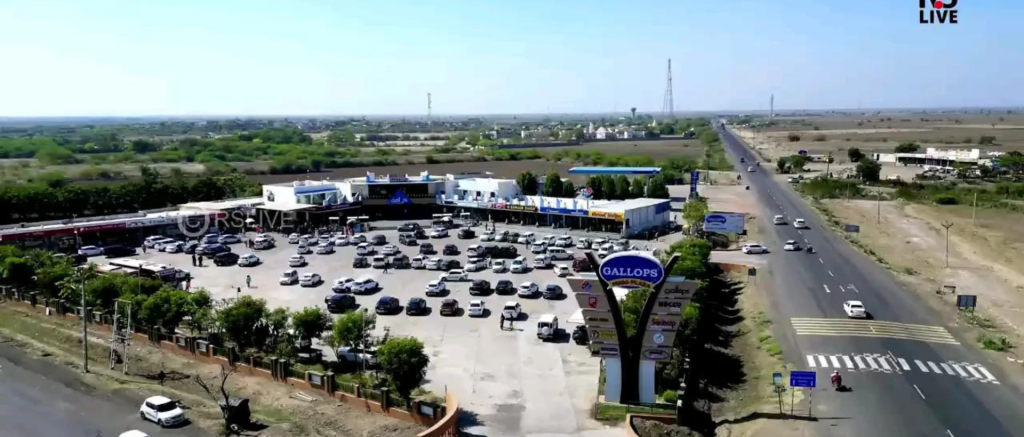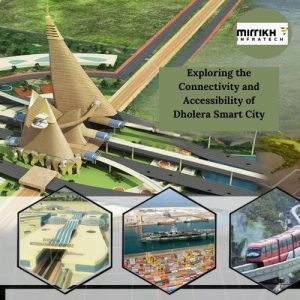Dholera, a city in the Indian state of Gujarat, is a beacon of futuristic urban planning. Recognized as India’s first greenfield smart city, Dholera aims to set a new benchmark for urban development. One of the crucial aspects of its smart city initiative is the integration of smart parking solutions. This blog delves into how Dholera’s smart parking solutions are revolutionizing urban mobility, enhancing convenience for residents and visitors, and contributing to the city’s sustainability goals.
The Need for Smart Parking Solutions
As urban populations grow, the demand for efficient parking solutions becomes more pressing. Traditional parking systems often result in congestion, wasted time, and increased pollution due to vehicles circling in search of parking spots. In Dholera, the smart city vision incorporates cutting-edge technology to address these issues comprehensively.
- Alleviating Traffic Congestion: By providing real-time data on parking availability, smart parking solutions reduce the time vehicles spend on the road searching for parking, thereby alleviating traffic congestion.
- Environmental Benefits: Reduced vehicle idling times translate to lower emissions, contributing to Dholera‘s sustainability targets.
- Enhanced User Experience: Smart parking systems offer convenience and time savings for drivers, improving the overall urban living experience.
Components of Dholera’s Smart Parking Solutions
Dholera’s smart parking system is a complex integration of various technologies designed to work seamlessly together. Here are the key components:
- IoT Sensors: These sensors are installed in parking spaces to detect the presence or absence of vehicles. They communicate this data to a central system, providing real-time updates on parking availability.
- Smart Meters: Digital meters replace traditional parking meters, allowing for cashless transactions and integration with mobile apps.
- Mobile Applications: These apps enable users to find available parking spaces, reserve spots, and make payments effortlessly.
- Data Analytics: Advanced analytics help manage parking resources efficiently, predicting demand patterns and optimizing the allocation of parking spaces.
- Automated Payment Systems: These systems streamline the payment process, reducing the need for human intervention and enhancing user convenience.
How It Works
The smart parking system in Dholera functions through a coordinated process involving various technological components:
- Detection and Data Collection: IoT sensors placed in each parking spot detect whether the space is occupied or vacant. This data is transmitted to a central database in real-time.
- Data Processing and Analysis: The central system processes the incoming data and uses predictive algorithms to forecast parking availability and demand.
- User Interaction: Through mobile applications, users can access real-time information about available parking spots, reserve spaces in advance, and make payments. The app also provides navigation to the chosen parking spot.
- Automated Management: The system automatically manages parking spaces, directing vehicles to the nearest available spots and adjusting pricing dynamically based on demand.
Benefits of Dholera’s Smart Parking Solutions
Environmental Impact
One of the significant advantages of smart parking is its positive impact on the environment. By minimizing the time vehicles spend searching for parking, the system reduces fuel consumption and emissions. This aligns with Dholera’s vision of becoming a green, sustainable city.
- Reduced Emissions: Less time spent idling and driving in search of parking translates to fewer carbon emissions.
- Lower Fuel Consumption: Efficient parking reduces unnecessary fuel use, contributing to energy conservation.
- Encouragement of Eco-friendly Practices: The availability of convenient parking encourages the use of public transport and other eco-friendly transportation options.
Economic Efficiency
Smart parking systems also offer substantial economic benefits:
- Cost Savings: Automated systems reduce the need for extensive manpower, lowering operational costs for parking management.
- Revenue Generation: Dynamic pricing and efficient space utilization can increase revenue from parking facilities.
- Economic Growth: Improved traffic conditions and convenience attract businesses and visitors, fostering economic development.
Improved Urban Mobility
Enhancing urban mobility is a core objective of smart parking solutions:
- Reduced Traffic Congestion: By directing drivers to available parking spots, the system minimizes traffic congestion.
- Time Savings: Drivers save time that would otherwise be spent searching for parking, enhancing productivity and overall satisfaction.
- Accessibility: Smart parking solutions ensure that parking spaces are used efficiently, making it easier for people to find parking near their destinations.
Challenges and Solutions
Implementing smart parking solutions in Dholera is not without challenges. However, the city has adopted innovative approaches to overcome these obstacles:
- Initial Costs: The installation of IoT sensors, smart meters, and other technologies requires a significant initial investment. Dholera has tackled this by securing funding from various sources, including government grants and private investments.
- Technology Integration: Integrating multiple technologies into a seamless system can be complex. Dholera’s approach involves using standardized protocols and robust IT infrastructure to ensure smooth operation.
- User Adoption: Encouraging residents and visitors to use the new system is crucial. Dholera has launched awareness campaigns and provided incentives to promote the adoption of smart parking solutions.
Future Prospects
The future of smart parking in Dholera looks promising, with several potential developments on the horizon:
- Expansion of Services: The smart parking system can be expanded to include more areas of the city and additional types of vehicles, such as electric cars and bicycles.
- Integration with Smart City Infrastructure: As part of the broader smart city initiative, parking solutions can be integrated with other systems, such as traffic management and public transportation, for a more cohesive urban experience.
- Advanced Data Analytics: Continuous improvement in data analytics can lead to even more efficient management of parking resources and better prediction of demand patterns.
- User-Centric Enhancements: Future enhancements could include personalized services, such as reserved parking for frequent users and real-time notifications about parking availability.
Case Studies: Success Stories from Around the World
To understand the potential impact of Dholera’s smart parking solutions, it’s useful to look at successful implementations in other cities:
Barcelona, Spain
Barcelona has implemented a comprehensive smart parking system as part of its smart city initiative. The system uses sensors to monitor parking space occupancy and provides real-time information to drivers through a mobile app. The result has been a significant reduction in traffic congestion and improved parking efficiency.
San Francisco, USA
San Francisco’s SFpark project is another example of a successful smart parking initiative. The city installed sensors in parking spaces and introduced dynamic pricing to manage demand. The project has led to a decrease in parking-related traffic and more efficient use of parking spaces.
Amsterdam, Netherlands
Amsterdam’s smart parking system includes an extensive network of sensors and a mobile app that allows users to find and pay for parking spots. The system also supports electric vehicle charging stations, promoting sustainable transportation. The initiative has improved urban mobility and reduced the city’s carbon footprint.
Conclusion
Dholera’s smart parking solutions represent a significant leap forward in urban mobility and sustainability. By leveraging advanced technologies such as IoT, data analytics, and mobile applications, the city is setting a new standard for efficient, user-friendly, and environmentally friendly parking management. The benefits are multifaceted, ranging from reduced traffic congestion and lower emissions to economic growth and improved quality of life for residents and visitors.
As Dholera continues to develop and refine its smart parking system, it serves as a model for other cities looking to enhance their urban infrastructure. The success of Dholera’s initiative demonstrates the transformative potential of smart technologies in creating smarter, more sustainable urban environments.




